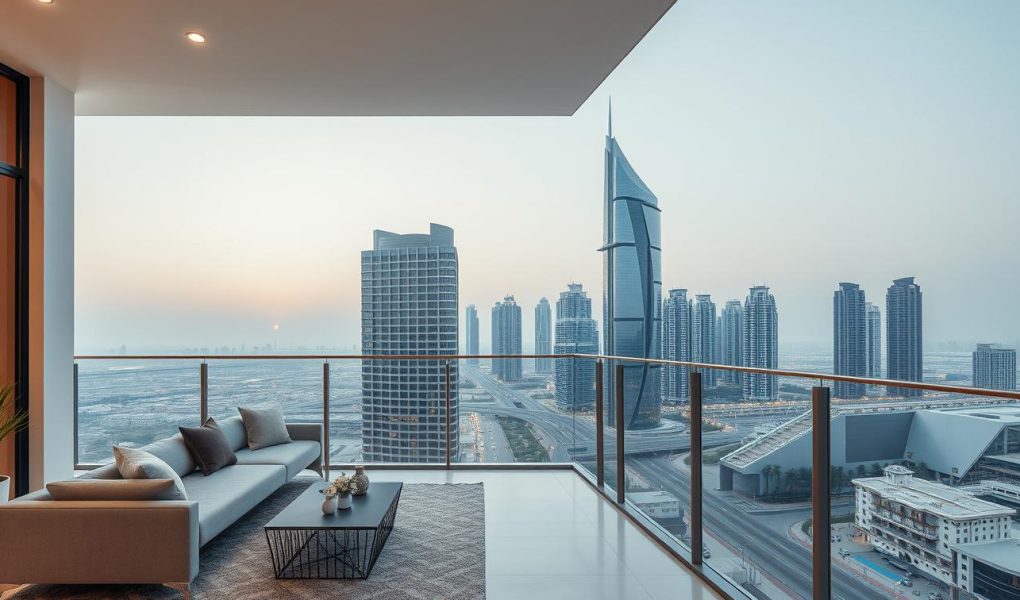Dubai is a vibrant city, full of opportunities and diverse lifestyles, making it a popular destination for residents and expats alike. The decision to rent is a major step, and understanding the renting in Dubai: pros and cons can help navigate this process effectively. One of the biggest decisions people face when moving to or living in Dubai is whether to rent or buy a home. Renting offers flexibility, but it also comes with challenges. Exploring the renting in Dubai: pros and cons ensures that tenants can weigh their options wisely and make decisions that suit their needs. Let’s delve deefper into the advantages and disadvantages of renting in Dubai to help you make an informed decision.
Understanding the Dubai Rental Landscape
Dubai’s rental market is dynamic and varies greatly depending on location, property type, and demand. A Dubai rental market analysis shows that properties range from affordable bed spaces to luxury apartments in iconic neighborhoods. This variety ensures options for all budgets and preferences.
What Influences Rental Costs?
The cost of renting in Dubai depends on factors such as proximity to business hubs, access to public transportation, and amenities like swimming pools or gyms. Popular areas like Dubai Marina or Downtown Dubai tend to have higher rents, while places like Deira or International City are more budget-friendly. Government regulations and market demand also play a significant role in determining rental rates, creating a competitive yet diverse marketplace. One of the affordable options is Room for Rent in Dubai.

Trends in the Rental Market
Over the years, Dubai’s rental market has seen fluctuating trends. New developments in prime areas have led to an increase in luxury rentals, while affordable housing projects aim to cater for middle-income groups. Additionally, many Lessors are now offering flexible payment plans to attract tenants, further enhancing the appeal of renting.
Advantages of Renting in Dubai
Renting is an attractive option for many, especially for newcomers or those unsure of their long-term plans. For individuals or families moving to Dubai for the first time, renting provides a sense of flexibility and freedom to explore the city’s diverse neighborhoods without being tied down by property ownership. Whether you’re adapting to a new job, settling into a new community, or simply testing the waters before committing to a long-term investment, renting allows for smoother transitions and fewer obligations. It also enables people to experience high-end amenities and modern living spaces in Dubai’s luxury neighborhoods without the financial burden of ownership. This flexibility makes it a practical choice for many residents.
For those looking for user-friendly platforms, Homebook.ae has emerged as a reliable resource for renting in Dubai. The platform specializes in budget-friendly monthly rentals, offering a range of options from shared accommodations to private apartments. Homebook.ae ensures verified listings, detailed descriptions, and easy navigation, making it an excellent choice for prospective tenants seeking affordable and flexible living arrangements in Dubai.
Related Post: Tips for Finding Rentals with Community Amenities in Dubai
Flexibility and Mobility
One of the top advantages of renting in Dubai is the flexibility it offers. If your job or lifestyle requires you to move frequently, renting allows you to change locations easily without the stress of selling a property. This is particularly beneficial in Dubai, where neighborhoods vary greatly in amenities and vibe.
Lower Upfront Costs
Unlike buying, which requires a hefty down payment, renting has lower upfront costs. You’ll typically need to pay a security deposit and a few months’ rent in advance, making it more affordable initially. For expats or those on short-term assignments, this is a cost-effective way to secure accommodation without committing large sums of money.
Access to Luxuries
Renters can enjoy premium facilities, such as pools, gyms, and parking, without worrying about maintenance costs. This makes living in Dubai’s high-end neighborhoods more accessible. In many cases, renting allows individuals to experience a luxurious lifestyle at a fraction of the cost of homeownership.
No Maintenance Responsibilities
In most rental agreements, Lessors are responsible for major repairs and maintenance. This relieves tenants from the burden of unexpected repair costs and ensures that the property remains in good condition.

Disadvantages of Renting in Dubai
While renting has its perks, there are some downsides to consider. Renting often means relinquishing the ability to build equity in a property, which is a significant financial consideration for those looking to invest in their future. Additionally, tenants may face annual rent increases, which can strain budgets and make long-term financial planning challenging. Limited control over property modifications, such as redecorating or renovations, can also be frustrating for those who wish to personalize their living space. Finally, renting may include hidden costs like maintenance fees and utility surcharges, which can add unexpected expenses to your monthly budget.
No Long-Term Investment
Renting means you won’t build equity or own a property, which can feel like wasted money over time. This is one of the major disadvantages of renting in Dubai compared to buying.
Rent Increases and Limited Control
Lessors in Dubai can increase rent within government regulations, which might disrupt your budgeting. Additionally, tenants have little control over property upgrades or changes. This lack of control extends to lease renewals, where tenants may face the inconvenience of relocating if their rental terms are not extended.
Restrictions on Personalization
When you rent, there may be limitations on decorating or making significant changes to the property, which can make it feel less like home. For tenants who value customization, this can be a significant drawback.
Comparing Long-Term vs. Short-Term Rentals in Dubai
Deciding between long-term vs. short-term rentals in Dubai depends on your lifestyle and needs. Long-term rentals are often more affordable monthly and provide stability, while short-term leases are perfect for temporary stays but tend to cost more.
Cost Differences Between Long-Term and Short-Term Rentals
Long-term rentals usually require a year-long lease, which often comes with a discounted monthly rate. Short-term rentals, on the other hand, are priced higher due to their flexibility, making them ideal for visitors or those on temporary work assignments. Tenants must weigh these costs against their needs to make an informed choice.
Flexibility and Commitment
Short-term rentals offer greater flexibility, allowing tenants to move out with minimal notice. This makes them appealing to those who value adaptability. Long-term leases, however, provide a sense of stability, which is essential for families or individuals planning to stay in one place for an extended period.
Amenities and Services
Short-term rentals often come fully furnished and include utilities, Wi-Fi, and sometimes even housekeeping services, making them convenient for temporary stays. In contrast, long-term rentals may require tenants to arrange their own furniture and utility setups, but they offer more customization options.
Ideal Scenarios for Each Option
Short-term rentals are ideal for expatriates on probation periods, tourists, or professionals on short contracts. Long-term rentals, however, are better suited for families, individuals with permanent jobs, or anyone planning to settle in Dubai for more than a year.
Finding the Right Fit
To decide between the two, consider your duration of stay, budget, and personal needs. If you value flexibility and convenience, short-term rentals may be the way to go. For those seeking cost efficiency and stability, a long-term lease is likely the better choice.
Related Post: The Affordable and Best Areas to Rent in Dubai Based on Salary Ranges

Tips for Prospective Tenants in Dubai
Renting in Dubai can be a smooth process if you plan ahead and understand the local market. Start by researching neighborhoods that align with your lifestyle and budget. Popular areas like Dubai Marina offer luxury living, while Deira provides more affordable options. Familiarize yourself with rental laws, such as the Ejari system, to ensure your rights as a tenant are protected. It’s also crucial to factor in all potential costs, including utilities and maintenance fees, to avoid unexpected financial strain. By being prepared and informed, you can find a rental property that suits your needs perfectly.
Understand Rental Agreements
Carefully read your lease agreement and familiarize yourself with Dubai’s rental laws, including the Ejari system, which protects tenant rights. Knowing your responsibilities and rights can prevent future conflicts.
Budget Smartly
Besides rent, factor in additional costs like utility bills, maintenance fees, and agent commissions. This gives a complete picture of the cost of renting in Dubai. Always plan for unexpected expenses to avoid financial surprises.
Choose the Right Neighborhood
Your choice of location can greatly impact your lifestyle. Living in Dubai: renting insights suggest selecting neighborhoods based on proximity to work, schools, and recreational areas. Consider visiting potential neighborhoods to experience their vibe firsthand.
Conclusion
Deciding to rent in Dubai comes with both benefits and challenges. While it offers flexibility and access to luxurious living, it lacks the investment benefits of owning property. By understanding the advantages and disadvantages of renting in Dubai and analyzing the Dubai rental market, you can make a choice that aligns with your lifestyle and financial goals.
Frequently Asked Questions About Renting in Dubai
What Are the Average Rental Prices in Dubai?
Rental prices vary by property type and location. For example, a one-bedroom apartment in Downtown Dubai may cost more than a similar unit in Deira due to the premium location, proximity to iconic landmarks, and availability of luxury amenities. In contrast, areas like Deira and Al Nahda offer more affordable options, catering to those with tighter budgets or looking for more traditional surroundings. Additionally, factors such as the property’s age, included utilities, and proximity to public transportation can further influence the overall rental price. Understanding these dynamics is essential for making informed decisions when searching for a rental property in Dubai.
Is Renting Better Than Buying in Dubai?
Renting offers flexibility, while buying is ideal for those planning to stay long-term and build equity. Renting is particularly beneficial for individuals who are new to the city or those with uncertain career trajectories, as it allows them to adapt to changes without the burden of owning property. Moreover, renters can experience a variety of neighborhoods and housing styles before making a permanent decision, providing valuable insights into the lifestyle that best suits them.
Are There Hidden Costs Associated with Renting in Dubai?
Yes, renters should consider additional expenses like maintenance fees, utilities, agency fees, and Ejari registration costs. These hidden costs can add up, so it’s important to budget accordingly. For instance, utility charges can fluctuate based on seasonal energy consumption, adding unpredictability to monthly expenses. Agency fees, which are often a percentage of the annual rent, can also represent a significant upfront cost for tenants. Planning ahead and accounting for these potential charges can make the renting process more manageable and prevent unexpected financial stress.
How Do I Choose the Best Neighborhood for Renting in Dubai?
Choosing a neighborhood depends on your lifestyle and budget. Areas like Dubai Marina are great for luxury living, while Deira offers more affordable housing options. Consider proximity to work, schools, and amenities.
What Should I Know About the Ejari Registration Process?
Ejari is a system designed to regulate rental agreements in Dubai. Tenants must register their lease with Ejari to make it official. This process ensures that the contract is legal and protects both tenants and Lessors.
